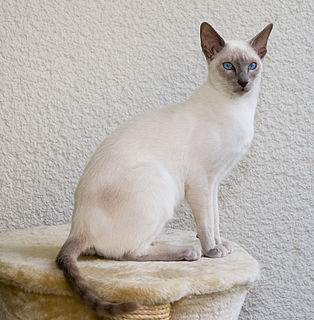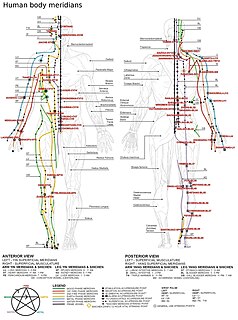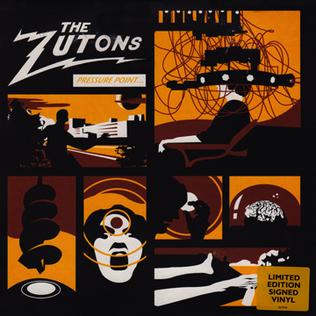
Traditional Chinese medicine (TCM) is a branch of traditional medicine in China. It is described to be "fraught with pseudoscience", and the most obvious reason why it has not delivered many cures is that the majority of its treatments have no logical mechanism of action.

The melting point of a substance is the temperature at which it changes state from solid to liquid. At the melting point the solid and liquid phase exist in equilibrium. The melting point of a substance depends on pressure and is usually specified at a standard pressure such as 1 atmosphere or 100 kPa.

Acupressure is an alternative medicine technique similar in principle to acupuncture. It is based on the concept of life energy which flows through "meridians" in the body. In treatment, physical pressure is applied to acupuncture points with the aim of clearing blockages in these meridians. Pressure may be applied by hand, by elbow, or with various devices.

Massage is the manipulation of the body's soft tissues. Massage techniques are commonly applied with hands, fingers, elbows, knees, forearms, feet, or a device. The purpose of massage is generally for the treatment of body stress or pain. A person who was professionally trained to give massages was traditionally known as a masseur (male) or a masseuse (female), but those titles are outmoded, and carry some negative connotations. In the United States, the title massage therapist has been recognized as a business norm for those who have been professionally trained to give massages.

The Siamese cat is one of the first distinctly recognized breeds of Asian cat. Derived from the Wichianmat landrace, one of several varieties of cat native to Thailand, the original Siamese became one of the most popular breeds in Europe and North America in the 19th century. The carefully refined, more extreme-featured, modern-style Siamese is characterized by blue almond-shaped eyes; a triangular head shape; large ears; an elongated, slender, and muscular body; and various forms of point colouration. Other than colouration, the modern-style Siamese bears little resemblance to the original stock, and the more moderate, traditional, or "old-style" Siamese, with a much rounder head and body, has been re-established by multiple registries as the Thai cat. The International Cat Association describes the modern Siamese as affectionate, social, intelligent, and playful into adulthood, often enjoying a game of fetch. Siamese tend to seek human interaction and also like companionship from other cats.

Kalaripayattu, also known simply as Kalari, is an Indian martial art and fighting style that originated in modern-day Kerala, a state on the southwestern coast of India. Kalaripayattu is held in high regard by martial artists due to its long-standing history within Indian martial arts. It is believed to be the oldest surviving martial art in India. It is also considered to be among the oldest martial arts still in existence, with its origin in the martial arts timeline dating back to at least the 3rd century BCE.

The Coral are an English rock band, formed in 1996 in Hoylake on the Wirral Peninsula, Merseyside. The band emerged during the early 2000s. Their 2002 debut album The Coral, from which came the single "Dreaming of You", was nominated for the Mercury Music Prize and listed as the fourth best album of the year by NME Magazine. Their second album, Magic and Medicine (2003), produced four UK Top 20 singles, including "Pass It On". In 2008, after guitarist Bill Ryder-Jones left the band, they continued as a five-piece.

A pressure point derives from the meridian points in Traditional Chinese Medicine and Indian Ayurveda and Siddha medicine, and the field of martial arts, and refers to an area on the human body that may produce significant pain or other effects when manipulated in a specific manner.

The Zutons were an English indie rock band, formed in 2001 in Liverpool.

Traditional Korean medicine is traditional medicine practiced in Korea. It originates from traditional Chinese medicine principles.

The meridian system is a concept in traditional Chinese medicine (TCM) about a path through which the life-energy known as "qi" flows.
Manual therapy, or manipulative therapy, is a physical treatment primarily used by physical therapists, physiotherapists to treat musculoskeletal pain and disability; it mostly includes kneading and manipulation of muscles, joint mobilization and joint manipulation. It's also used by occupational therapists, chiropractors, massage therapists, athletic trainers, osteopaths, and physicians

"Valerie" is a song by English indie rock band The Zutons from their second studio album, Tired of Hanging Around (2006). The song was later covered by Mark Ronson, with lead vocals provided by Amy Winehouse, reaching number two on the UK Singles Chart in 2007.

"Devil's Deal" is a song by The Zutons which became their first single release. One of its B-Sides, "Zutonkhamuun", was later a B-side on "Pressure Point" as an alternate extended version.

"Pressure Point" is a song by The Zutons. It was the first single to be released from their debut album Who Killed...... The Zutons?. During the music video, a number of chaotic incidents occur around the musicians, including a hanging dress, a cat and its milk, the flow of the milk, and the billboard. At the end, the billboard collapses, making it look like the musicians are dead, but they still sing and tap their feet.
The touch of death refers to any martial arts technique reputed to kill using seemingly less than lethal force targeted at specific areas of the body.

This article gives the discography for the English rock band The Zutons. Between their formation in 2001 and 2008 they released three studio albums and 14 singles, nine of which entered the top 40 UK singles chart.
Varma Kalai, is a Tamil traditional art of vital points. It originated in Tamil Nadu, India. It is a component of traditional massage, alternative medicine, traditional yoga and martial arts in which the body's pressure points (Varmam) are manipulated to heal or cause harm. The healing application called Vaidhiya Murai is a part of used Siddha Medicine. Its combat application is known as Adimurai, Adi Murai or Varma Adimurai meaning "pressure-point striking", and can be done either empty-handed or with a blunt weapon such as a stick or staff. Usually taught as an advanced stage of Adi Murai and Kuthu Varisai practice in southern Tamil Nadu, strikes are targeted at the nerves, veins, tendons, soft tissues or ligaments, organs and bone joints.
Ayurvedic acupressure is a particular kind of treatment or an alternative medical treatment, which integrates the knowledge of ancient Ayurveda and the principles of acupressure, allegedly to completely heal and cure physical, mental, emotional and spiritual illnesses.













